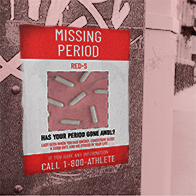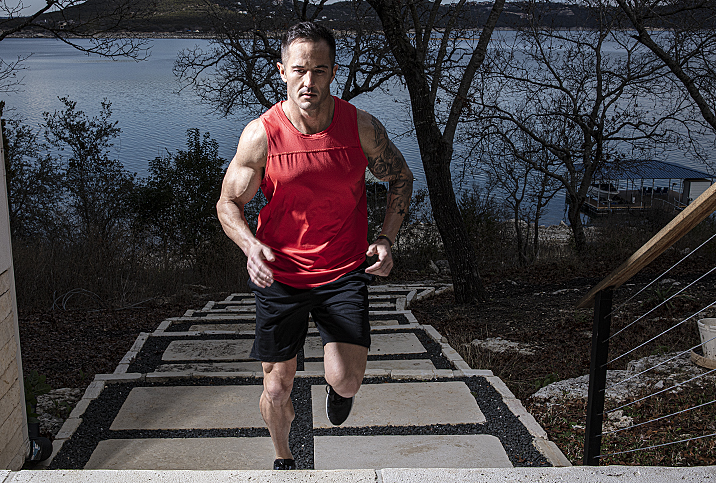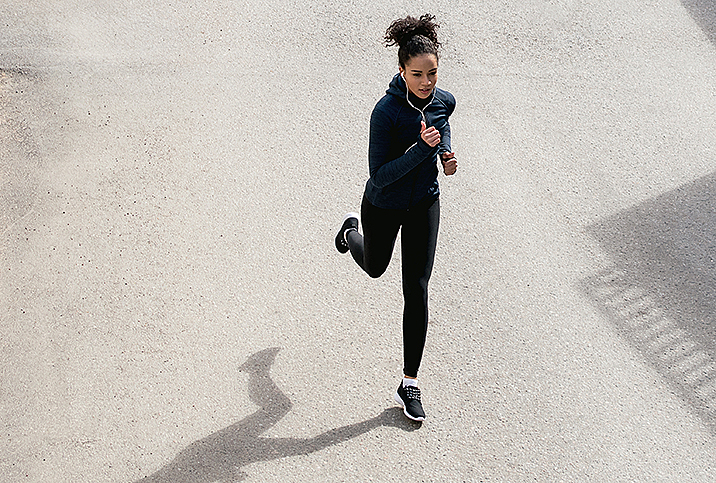Are Runners Better in Bed?

You've been moving your body for hours and sweating the entire time. Your feet are blistered and at least one or two of your toenails have detached. Despite this physical state, you keep running, placing one foot in front of the other, even as the gel you ate half an hour ago stirs in your stomach.
You inch closer to an aid station where your "crew"—whoever likes you enough to spend hours outdoors waiting for you—offers you electrolyte drinks, pretzels, grapes, gummy bears and energy bars. After a quick rest in a folding chair, you're back on the trail for another 30 miles before crossing the finish line.
This experience is all too familiar to runners who finish "ultramarathons," organized races covering distances beyond the 26.2 miles associated with marathons. Ultramarathons range from about 31 miles, or 50 kilometers, to more than 100 miles. The Moab 240, a 238.2-mile race in Utah, has a 113-hour cutoff time and a total elevation gain of about 58,000 feet.
To win races and set records in this kind of competition requires superior aerobic fitness, fortitude, nutrition, mental toughness and a ton of training. But does any of that translate into superior stamina or enhanced sexual health? Or does all the time spent training, racing and recovering make it difficult to foster meaningful romantic and sexual relationships?
Are runners better in bed than the rest of us?
Physical health and running
Reese Slobodianuk is a running coach with Ornery Mule in Delafield, Wisconsin, where he also has a day job assisting physical therapists. He said proper training shouldn't have any negative effects on sexual health.
Slobodianuk, who finished first in the men's division and second overall at the Kettle Moraine 100 in June 2022, also said it's possible to overdo most anything. Running coaches who approach their work holistically, as he tries to do, should be on the lookout for overwork in their athletes.
"I think that when you take training and [you're] properly curtailing [it] to somebody's overall kind of stresses of the rest of their life, there shouldn't be a point where somebody is so taxed from running that their sexual health goes down," Slobodianuk explained. "That's kind of a clear indicator that there's something not hormonally right or neurochemically right, which can result from too much stress."
Slobodianuk emphasized that dedicated training gives runners healthier habits, cardiovascular efficiency and improved muscular endurance. These assets could prove a boon for performance on the trails and in the bedroom, but ultrarunners don't acquire "any extra superhuman ability," he said. Plus, once you reach a certain threshold, Slobodianuk said you start playing with fire. To mitigate danger, he advised gradually adding miles or intensity with an emphasis on easy running and recovery.
"You can take somebody who is trained for 100 miles, such as myself, and even though I'm putting in 70-, 80-, 90-, 100-mile weeks, I can do that fairly consistently if I train [at a] relatively easier effort," he said. "That pace might be different for everybody."
[Healthier habits, cardiovascular efficiency and improved muscular endurance] could prove a boon for performance on the trails and in the bedroom, but ultrarunners don't acquire 'any extra superhuman ability.'
Elisabet Barnes, M.Sc., an ultrarunning coach and a certified sexologist and relationship therapist in Norway, said exercise can have a positive impact on general and sexual health. But she acknowledged ultrarunners can push themselves to extremes, especially at the level of elite competition, with which she's no stranger. Not once but twice, Barnes won the Marathon Des Sables, a multistage adventure race covering 156 miles (250 km) over six days in the Sahara Desert.
She said ultrarunning doesn't tend to attract people interested in moderation. After all, "If you want to be moderate, you could train for [a] half-marathon," she explained.
People get into the sport for various reasons, Barnes said. Perhaps they want to push themselves, they have a lot of energy they want to channel or they've struggled with addictions or compulsive tendencies. While it supports an active lifestyle, ultrarunning provides justification to take your body to extremes, which can have adverse consequences.
"There's definitely a pressure in ultrarunning to have a lean body composition, especially if you're at the higher level," Barnes affirmed.
Competitors who win ultras are quite lightweight, she added. A person can run faster if they weigh less, provided their health and fitness don't suffer as a result. Some people handle the pressure better than others, but for certain runners, it can lead to body dysmorphia (distorted body image) and eating disorders.
"If you don't like your body, you're not going to feel good about sex," Barnes explained. "You don't want to show your body to someone else."
She said she's probably 11 to 15 pounds heavier than she was when competing professionally, and her body seems much happier.
"It was a lot of effort maintaining that low weight," she said. "And because it's a lot of effort to maintain it, it's probably not the [healthiest] weight. The body gravitates towards something different."
High training volume without matching energy intake can lead to RED-S, or relative energy deficiency in sport, she added.
"You will basically be in a state of energy deficiency, and this is absolutely not uncommon," she continued. "And it can happen to both men and women. But it's affecting women more."
The onset of energy deficiency can be quick, causing estrogen levels to fall in women and weakening bones in the worst of cases. Women with RED-S can miss periods and experience vaginal dryness, Barnes explained. Plus, recovery can take a while.
Potential effects of excessive training for men include a reduced ability to achieve an erection or reach climax, Slobodianuk said.
"If you're overtrained and your muscles are achy, your hips are weak, there can be those types of ramifications, too," he said. "Again, there's a safe way to progress the body to greater heights, as opposed to overtraining and then reaching that point where you do hit those deleterious effects."
Running and sex
Barnes said the consequences of pushing through energy deficiency can include depression, irritability and difficulty concentrating.
"All of those can impact on your sexual desire but also your ability to experience sex as pleasurable," she noted.
Conversely, she suggested people who manage the stressors and find balance in ultrarunning enjoy sexual benefits, including positive body image and self-esteem. Similarly, Slobodianuk said reaching goals in workouts tend to confer a sense of self-confidence. It's an important factor in racing and sexual performance.
However, he has also let the pendulum swing too far in the other direction. He said he has dug himself into a hole by going too hard or not taking enough rest. Then, mood and interest in sex suffer. At those points, there's little or no desire to engage with other humans, let alone participate in sexual activity.
Many people can be perfectly fine physiologically without sex or sexual desire, Barnes said. An aversion to spontaneously desiring sex is quite common among women in particular.
The male athletes Slobodianuk coaches are often comfortable sharing with him when they have diminished sex drive.
"It's a good first sign for us that we need to step back and our body needs to recover a little bit," he said. "We need to destress our mind, destress the body."
Less intense workouts and a reduction in training load are often in order.
Finding time, community and intimacy
Adding ultrarunning to an already full schedule can result in less time for intimacy for people in long-term partnerships.
Women are less likely to spontaneously desire sex, instead needing stimulus to trigger arousal, so intimacy has to be consciously set aside in a relationship, Barnes said. Cramming a lot into life, like training for an ultra, may make sexual intimacy difficult.
"You need to invest in the relationship," she said. "And what happens with people, they go to work, they have kids, kids have activities—all of these things that we have to do. And we put that in the calendar, and then the partner sort of comes last on the list.
"And then, perhaps, you decided you have a midlife crisis and now you're going to go and start ultramarathon running," Barnes continued. "So, on top of your schedule, you start to run. There is even less time for your partner."
Running becomes detrimental to the relationship in such cases.
"What I've also seen happening is that the person who starts to run becomes fit," Barnes said. "They start to look after themselves."
'I think there's something very romantic when two people enjoy being outside and enjoy pushing each other and enjoy seeing each other succeed and cheering each other on.'
Meanwhile, the partner might not.
"And so then there is this mismatch in physical shape and perceived attractiveness, [and] perhaps that isn't helpful either in the relationship," she said.
Barnes said allocating travel money and mental energy to racing while the partner is left out can lead to a disconnection between the two people. Unintentionally or otherwise, a partner who starts training for an ultramarathon may use the routine to stay busy, avoid intimacy and distance themself from the other person in the relationship.
"Maybe that's where some people find someone new in the running community," she said. "I think that the ultrarunning community, just like any other community that you would find yourself in, you connect with people around the common interests. And when we can connect with people and talk to people and experience something emotional together, that creates intimacy."
"I think the community is hugely powerful; I mean, that's how I met my girlfriend," Slobodianuk said. "Because we both love endurance sports, we both love being outside. I think there's something very romantic when two people enjoy being outside and enjoy pushing each other and enjoy seeing each other succeed and cheering each other on."




















